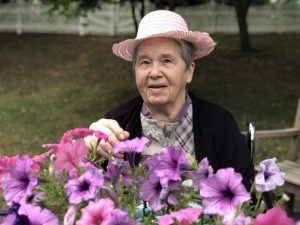Recreational Therapy Is Essential for Long-term Alzheimer’s Care
Written by |

As the senior population increases, the need for long-term care also rises. Health Care Financing Review characterizes long-term care as “medical, personal, social, and psychological care over extended time periods.”
In just 10 years, people 65 or older will account for one-fifth of the population in the United States, and it is projected that by 2025, diagnoses of Alzheimer’s disease will increase by nearly 27 percent for this segment of the population, according to a 2019 Alzheimer’s Disease Facts and Figures Report by the Alzheimer’s Association.
It is imperative that cognitively engaging treatments become a staple of long-term care, especially for those living with dementia.
Mercy LIFE, which stands for “Living Independently for the Elderly,” is an adult day program serving seniors in Pennsylvania. The program presents adults 55 and older with comprehensive, cognitively engaging treatments. These treatments assist in reducing the symptoms associated with Alzheimer’s disease via recreational therapy, and in some cases, the program permits participants to avoid pharmacological care.
What is recreational therapy?
According to Chanel Coleman, recreation therapy manager at Mercy LIFE, recreational therapy shares some similarities with physical and occupational therapy, but with a primary difference.
“Our main focus is leisure interest and leisure engagement. So while we may look at a person’s past interests, current interests, and future interests, we use those leisure activities to promote wellness,” Coleman said during a recent phone interview.
Recreational therapy taps into the part of the brain that is stimulated by an activity the person once enjoyed.
“If a participant has a past interest in music, or playing a certain instrument, or maybe they were a cook in their past life, I would use those leisure interests, or leisure modality, to promote cognitive stimulation within an adaptive activity,” Coleman said.
Treating the cognitively impaired with recreational therapy
Seniors participating in the day program at Mercy LIFE receive a health plan that is specifically designed. Mercy LIFE’s goal is to help seniors continue to live as independently as possible, including those with cognitive impairment. Before entering recreational therapy, patients undergo a therapeutic recreation and leisure assessment.
“This involves asking the participant about their past and their current interests, as well as assessing what we feel or what we know will be in their best interest to promote cognitive stimulation therapy,” Coleman said.
When the person being assessed is unable to self-report interests, family members and caregivers are interviewed to provide details about activities their loved one once engaged in.
As Alzheimer’s progresses, it not only robs our loved ones of their memories, but also depletes their interests in being involved with old or new activities. In such cases, Mercy LIFE recreational therapists introduce leisure education.
“We may present them with different types of cognitive stimulating activities that we know would promote stimulation. This is much like a trial-and-error process. We may present them with a tabletop stimulation, simulating games. They may be able to engage positively or we may see that they’re disinterested. Or they might not even engage in it. It could involve a lot of trial and error, but all with the theme of cognitive stimulation,” Coleman said.
A nonpharmacological approach
While medical science continues to make strides in slowing the progression of Alzheimer’s disease while searching for a cure, some patients respond negatively to medication, which increases their “acting out.” Recreational therapy can address those issues.
“Some [medications] have an effect that can change a participant’s mood or behavior, so adding a recreation therapy or leisure modality in conjunction sometimes with medication can decrease some of those symptoms,” Coleman said. “It’s not used to replace [medications], but a lot of the therapeutic approaches can modify or decrease a lot of the symptoms we are seeing with cognitive impairments, dementia, and Alzheimer’s, such as outburst, or behaviors, or wandering.”
Recreational therapy is effective in calming cognitive disorders, but experiences vary for participants. Some of the therapies available through Mercy LIFE are art, music and memory, dance and movement, and horticultural and animal-assisted therapy.
“The main goal is to engage participants in therapies that are beneficial and that decrease symptoms that are common to dementia and Alzheimer’s,” Coleman said.
If you live in the Philadelphia area, you can reach Mercy LIFE for more information about the benefits of recreational therapy by calling (215) 339-4747.
If you live outside of Pennsylvania and would like to explore how recreational therapy might assist in caring for a loved one, ask your loved one’s physician about providing a list of recreational therapists in your local area. You may also contact the American Therapeutic Recreation Association.
***
Note: Alzheimer’s News Today is strictly a news and information website about the disease. It does not provide medical advice, diagnosis, or treatment. This content is not intended to be a substitute for professional medical advice, diagnosis, or treatment. Always seek the advice of your physician or other qualified health provider with any questions you may have regarding a medical condition. Never disregard professional medical advice or delay in seeking it because of something you have read on this website. The opinions expressed in this column are not those of Alzheimer’s News Today or its parent company, Bionews Services, and are intended to spark discussion about issues pertaining to Alzheimer’s Disease.







Idalmis
Quiero conocer más terapias sobre Alzheimer
Ray Burow
Translation: I want to know more about Alzheimer's therapies.
Ray Burow
Hello Idalmis,
Alzheimer's News Today is a trusted resource for learning what is available for treating dementia and Alzheimer's disease. Peruse upcoming and past news articles for information on therapy and medications, that are either on the horizon or are currently on the market. Clinical trials are also an option for some patients and you can learn more here: http://alzheimersnewstoday.com/2017/06/01/myths-and-facts-about-clinical-trials-for-alzheimers-disease/
In addition to Alzheimer's News Today, visit the Alzheimer's Association website to find local resources in your area.
We wish you the best in the new year!
Ray Burow